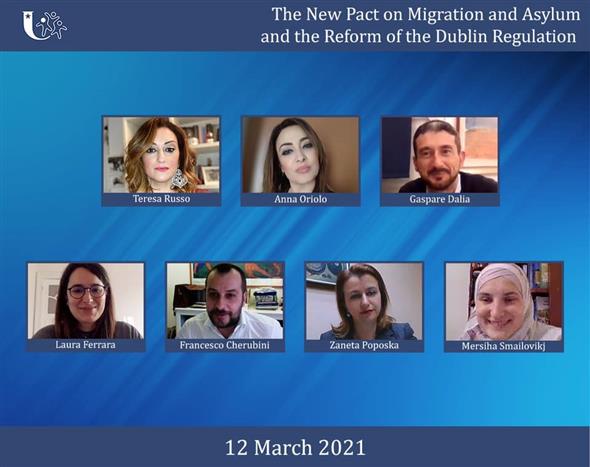On Friday 12 March 2021, starting at 2.30 pm, on the “Microsoft Teams” platform, the third training course of the Jean Monnet EUWEB Module dedicated to the New European Pact on Immigration and Asylum and the reform of the Dublin Regulation took place.

On Friday 12 March 2021, starting at 2.30 pm, on the “Microsoft Teams” platform, the third training course of the Jean Monnet EUWEB Module dedicated to the New European Pact on Immigration and Asylum and the reform of the Dublin Regulation took place.
The Lecture was opened by the introduction of Profs. Gaspare Dalia and Anna Oriolo and was followed by the speeches of Prof. Teresa Russo (Current Challenges of EU Immigration Policy: Are There Any Answers in the Pact?), of Dr. Laura Ferrara (The European Pact on Migration and Asylum: A New Opportunity to deadlock the Management of Migratory Flows?) and of Prof. Francesco Cherubini (Solidarity Mechanisms Within the CEAS: Unfair Past, Conflicting Present, Uncertain Future). Later, Dr. Zaneta Poposka (Right to Asylum in the Western Balkans: A Comparative Analysis of National Rules) and Mr. Mersiha Smailovikj (Access to Asylum along the Balkan Route: A Practice-Based Approach) addressed the analysis of the right of asylum in the Western Balkans countries. The final debate concluded the works of the course.
In her speech, Mersiha Smailovikj, spoked about practical approach of the asylum system in Macedonia. Since 2015, RNM is on the transit migration route which meant improving of the legal framework in reception of potential refugees and/or people in need of subsidiary protection. However, with the closing of the Western Balkan migration route, the changes of the legal framework, reception and social integration of people in protection by the State or, in asylum procedures has been slow. Also, since March 2016, most of people caught in irregular migration are pushed back towards Greece in large numbers on daily level, without supervision, strongly indication mass deportations taking place.
The local civil society organizations has pushed for changes in the legal framework and were successful, however, asylum applications been denied continuously by the Administrative court, which indicates non-applicability of the Law on asylum and subsidiary protection. Major problems with the applicability of the Law remain the same:
1. Asylum Application
2. Integration policies.
3. Protection under the Istanbul Convention on sexual and gender based violence
4. Push-back policy toward refugees and migrants.
Link of the original news: https://www.euweb.org/the-new-pact-on-migration-and-asylum-and-the-reform-of-the-dublin-regulation-12-march-2021/




